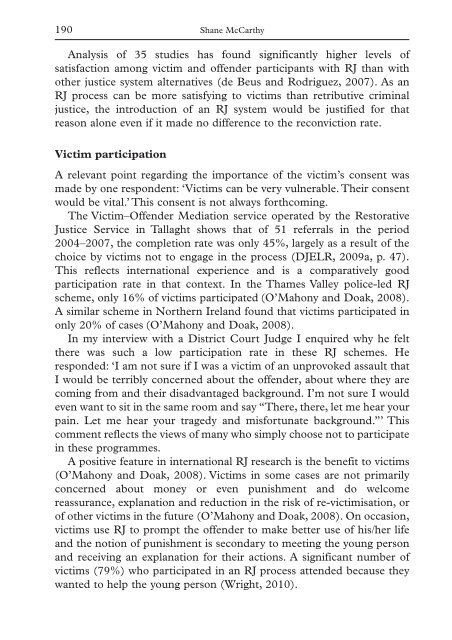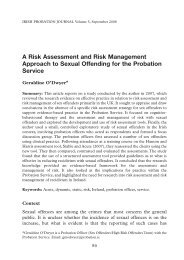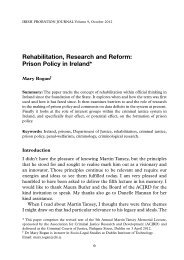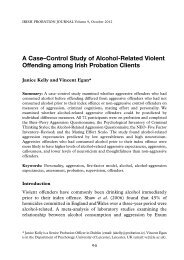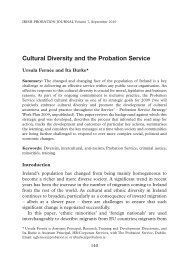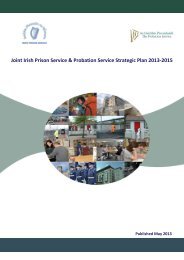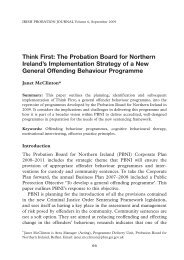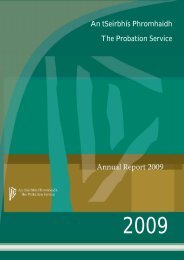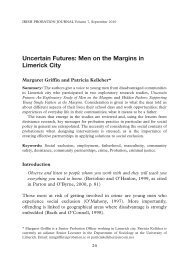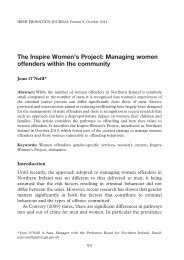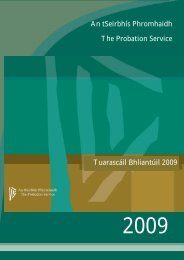Perceptions Of Restorative Justice In Ireland - The Probation Service
Perceptions Of Restorative Justice In Ireland - The Probation Service
Perceptions Of Restorative Justice In Ireland - The Probation Service
Create successful ePaper yourself
Turn your PDF publications into a flip-book with our unique Google optimized e-Paper software.
190 Shane McCarthy<br />
Analysis of 35 studies has found significantly higher levels of<br />
satisfaction among victim and offender participants with RJ than with<br />
other justice system alternatives (de Beus and Rodriguez, 2007). As an<br />
RJ process can be more satisfying to victims than retributive criminal<br />
justice, the introduction of an RJ system would be justified for that<br />
reason alone even if it made no difference to the reconviction rate.<br />
Victim participation<br />
A relevant point regarding the importance of the victim’s consent was<br />
made by one respondent: ‘Victims can be very vulnerable. <strong>The</strong>ir consent<br />
would be vital.’ This consent is not always forthcoming.<br />
<strong>The</strong> Victim–<strong>Of</strong>fender Mediation service operated by the <strong>Restorative</strong><br />
<strong>Justice</strong> <strong>Service</strong> in Tallaght shows that of 51 referrals in the period<br />
2004–2007, the completion rate was only 45%, largely as a result of the<br />
choice by victims not to engage in the process (DJELR, 2009a, p. 47).<br />
This reflects international experience and is a comparatively good<br />
participation rate in that context. <strong>In</strong> the Thames Valley police-led RJ<br />
scheme, only 16% of victims participated (O’Mahony and Doak, 2008).<br />
A similar scheme in Northern <strong>Ireland</strong> found that victims participated in<br />
only 20% of cases (O’Mahony and Doak, 2008).<br />
<strong>In</strong> my interview with a District Court Judge I enquired why he felt<br />
there was such a low participation rate in these RJ schemes. He<br />
responded: ‘I am not sure if I was a victim of an unprovoked assault that<br />
I would be terribly concerned about the offender, about where they are<br />
coming from and their disadvantaged background. I’m not sure I would<br />
even want to sit in the same room and say “<strong>The</strong>re, there, let me hear your<br />
pain. Let me hear your tragedy and misfortunate background.”’ This<br />
comment reflects the views of many who simply choose not to participate<br />
in these programmes.<br />
A positive feature in international RJ research is the benefit to victims<br />
(O’Mahony and Doak, 2008). Victims in some cases are not primarily<br />
concerned about money or even punishment and do welcome<br />
reassurance, explanation and reduction in the risk of re-victimisation, or<br />
of other victims in the future (O’Mahony and Doak, 2008). On occasion,<br />
victims use RJ to prompt the offender to make better use of his/her life<br />
and the notion of punishment is secondary to meeting the young person<br />
and receiving an explanation for their actions. A significant number of<br />
victims (79%) who participated in an RJ process attended because they<br />
wanted to help the young person (Wright, 2010).


